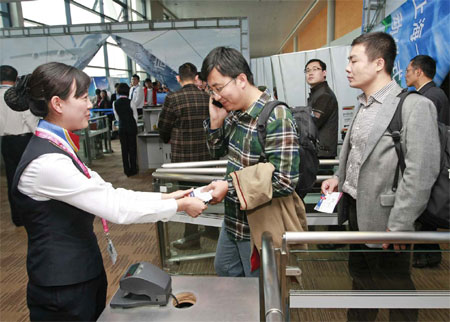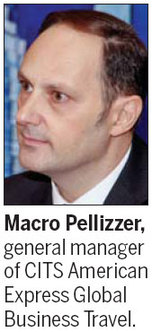Ready for takeoff
Updated: 2011-12-02 10:58
By Yan Yiqi (China Daily European Weekly)
|
|||||||||
Travel management companies buckle down for an expanding market
 |
|
Companies can better control travel costs by teaming with travel management firms, which have long-term relationships with hotels and airlines. Provided to China Daily |
Buoyed by the growing business travel market in China, international travel management companies and other industry players, such as airlines and hotels, are now looking to team up with Chinese companies where travel management is not yet popular.
According to the annual China Business Travel Barometer survey released by American Express in November, travel budgets have continued to increase among the 286 companies it surveyed.
The poll shows that 46.5 percent of the companies surveyed increased their annual business travel budgets by 6 percent.
"We are optimistic about the future of the business travel market in China," says Marco Pellizzer, general manager of CITS American Express Global Business Travel.
China, with $158.5 billion (118.5 billion euros) spending on business travel last year, is now the second largest business travel market after the United States, according to American Express. The company also predicts that China will surpass the US in 2015 with $309 billion in business travel expenditure.
Compared with the fast growing business travel market, travel management, widely adopted by Western companies to control costs, is still in its early infancy in China.
 |
"We estimate that the business travel market of Chinese companies can be as large as 300 billion yuan ($47 billion, 35.4 billion euros), but only 10 percent of the expenditure is properly managed by professional travel management companies," says Wu Kejian, director of Business Travel Department at Ctrip.com, a leading Chinese travel service company.
Wu says his company now has more than 1,000 clients in China, both international and domestic firms, but with the former accounting for the majority.
"The business travel sector of Chinese companies is still inadequately managed, and not yet influenced by the practices followed by multinational companies," Wu says.
Global travel management company Carlson Wagonlit Travel (CWT), until recently, only promoted itself in China to multinational companies from other countries because it felt Chinese companies didn't see the value in the services it provided.
The biggest challenge for international travel management providers is that Chinese companies, though aware of the huge market potential, have not been fully used to the concept of using professional travel management companies.
"There is, in Western eyes, a paradox at the heart of Chinese attitude toward business travel. Chinese business travelers are extremely price-conscious, and extensively search the Internet and other sources to find the cheapest fare for every journey," says Wang Lu, general manager of AirPlus International China Region, a global travel payment solution provider headquartered in Neu-Isenburg, Germany.
One of the reasons, pointed out by AirPlus, is that most Chinese companies still think that travel management expenses exceed the costs that will be saved by using the services.
In the beginning, when AirPlus entered the China market, it focused only on international enterprises. Part of the reason why the company did that was because global firms are familiar with the travel management concept, Wang says.
"China is a very special market. Chinese companies are interested in controlling travel costs on a tactical basis, but have not yet started to do it strategically. This concept is totally different from Western countries."
Tang Jinjiao, general manager of Knightly Formal Clothes International Co Ltd, a Chinese wedding dress and nightgown company, says his company still takes care of most of its travel reservations. The company has several hundred salespeople traveling around the country every month.
Tang says the company's finance department takes care of most of the plane tickets and hotel accommodations.
"Using a travel agency to book tickets and hotel rooms would cost us a lot. Why spend the money when our own employees can find the cheapest plane tickets and hotels?" Tang says.
However, 90 percent of the Chinese personnel responsible for managing travel requirements in a company spend less than one quarter of their work week on this task, compared with a worldwide average of 63 percent, says an AirPlus survey.
"Honestly speaking, the existence of travel management companies will pose challenges to our hotel rates, because these companies will normally spend more time sourcing accommodation providers and negotiating prices, however, the long-term partnership is still beneficial to our hotels," says Cinn Tan, senior vice-president of marketing and sales at Jin Jiang International Hotel Management Co Ltd.
Jin Jiang now has 110 chain hotels in China, and business clients account for 65 percent to 70 percent of its sales revenue.
According to Tan, most business clients haven't adopted travel management methods yet, but it will soon be a trend for many companies.
Tan also agrees that working with travel management companies can help hotels enter new market segments.
"Travel management companies like American Express and CWT have fixed client sources, and by teaming up with them, hotels can have additional distribution channels and can reach out to our target clients," she says.
With the market so large and attractive, major business travel players in China are now making efforts to help Chinese companies accept the concept of business travel management.
"Over the years, we have been educating companies in China on the importance of business travel management in the area of cost savings, compliance and control after we set up our joint venture," says Pellizzer from American Express.
That, to some extent, also explains why American Express Global Business Travel has been partnering with the Shanghai International Conference Management Organization to organize the China Business Travel Forum. The forum is an annual industry-leading event that brings corporate travel buyers together with the industry's most influential suppliers and experts, and provides expertise to help travel professionals create opportunities that will deliver benefits.
Ctrip.com has been targeting Chinese companies since the beginning of its business travel management sector in 2006, offering services to Chinese companies step by step.
"For those companies who haven't yet been able to register as business travel clients, we offer added services based on individual cases. This is a step to let them feel the convenience of travel management service first," Wu says.
Wu's company is also looking at an annual double-digit growth rate in this sector.
AirPlus is guiding the market on how important it is to manage business travel costs for a company by providing high quality services and solutions for their clients in China. The company is upbeat about the market potential.
"There are more and more Chinese companies that care about scientific business travel management procedure and data information, that's why we cooperate with many local companies successfully as well," says Wang.
"As Chinese companies expand into other markets, they will absorb the principles of travel management from those markets. There is already evidence of Chinese companies with foreign subsidiaries being the first to adopt travel management, sometimes at the request of the subsidiaries," she says.











